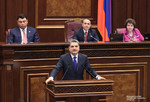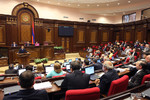Wednesday, 12 June 2013
Prime Minister Tigran Sargsyan’s concluding remarks at National Assembly
Dear National Assembly Chairman,
Dear Colleagues,
Let me express my gratitude to all the MPs for interested discussion. I will try to group those queries raised during the past two weeks in an attempt to give some estimates.
The first group of questions has to do with my person, including the allegations voiced here. I think that since they were voiced in this Hall, this is the right rostrum to give the answers.
My professional activities have been associated with the financial sector for the last 25 years. The concept and the mechanisms to combat money laundering in the Republic of Armenia was implemented under my direct supervision, and Mr. Javadyan can confirm this as he participated in the work of the commission that I used to chair on behalf of the President of the Republic.
All this can testify to my knowledge of offshore zones, offshore accounts and money laundering. And what am I accused of now? That I have founded a company in an offshore zone, intending to seize somebody’s property in Armenia or make a scheme by which I would be gaining money?
Anyone with the slightest knowledge of the financial system would agree that it sounds absurd: no need for explanations or justifications. Such nonsense could not even have crossed my mind.
Moreover, it is not so difficult to have a company registered in an offshore zone, say, on Nikol Pashinyan’s name without his authorization. There are numerous examples of it.
Yes, it is the characteristics of offshore zones, namely that economic entities can be established on anyone’s name. I have already provided all the necessary explanations in public, considering it as nonsense: I have never registered any entity in an offshore zone, neither have I authorized anyone to do so.
It is clear that this story has a very different purpose. Everyone can understand that money laundering is not done this way, and that odd deals are not concluded made in such a manner. The objective seems to be clear: this is an excellent opportunity for someone to be blamed and compromised.
Moreover, Haykakan Zhamanak newspaper asked me where I was that very day when the alleged enterprise was registered. I gave a detailed account to the public through Haykakan Zhamanak consisting in that on May 6, 2010, I was paying an official visit to Prague in the company of several Armenian journalists who knew every detail of my whereabouts as they provided nationwide coverage of my visit.
I could not one and the same time be in Cyprus and fly from Prague to Cyprus to register a company there. Those allegations, I take them easy, considering that this is neither the first nor the last time ones have been filed against me.
As it was rightfully stated in this room, there have been numerous such attempts to associate my name with scandalous stories of all kinds for the past 20 years. When I was Chairman of the Central Bank, I was accused of shutting down banks by making them bankrupt in a bid to get hold of them.
News columns used to appear stating that I owned a castle on the Mediterranean coast. Moreover, some journalists were said to have fetched compromising photos, talked to the neighbors who testified that there was a little child walking around, and as the Prime Minister had a child, then it must have been his son and things like that. These allegations were denounced indeed. Ever new charges were put into circulation stating that I am the owner of Nairit and so on.
This is in the natural course of democracy and we deliberately go down this path. Thanks to consistent efforts made by the government, the political majority and our President, we have adopted and are applying quite an important law, namely that the income and assets of 500 high-ranking officials should be subject to public scrutiny. We deliberately opted for this path, though many told us not to do so as it might be subject to political speculation. But this is the right way: every high-ranking official should be bound by the knowledge that their activities, assets and income would be exposed for public scrutiny.
Glad to be the target today, I will be ready to retort to allegations like that through sufficient evidence. A democratic society implies it, and this is inevitable.
Now let us see what kind of budget performance we should have to comply with our opponents’ wishes, as well as to answer those MPs who may have questions.
We have submitted a report of 2600 pages, of which 1,300 deal with non-financial issues. Furthermore, many other questions have been raised and answered during panel discussions over the past two weeks.
I would like to add to all this one major achievement of our country. We are among the top five countries in the world practicing online budget performance reports on a daily basis. Every day you can see how many pens, pencils, at what price and where we purchased. And you can do it from any city in the world where there is Internet access.
This is the highest level of transparency that exists in the world today. And that means that we have absolutely no purpose to hide anything from you. On the contrary, we are eager to be monitored even more closely as it provides a guarantee for efficacious budget spending.
We urge the Control Chamber to be open and transparent in their activities so that any inefficient use of funds may be the subject of discussion, which can help us avoid future abuses. There is no alternative to it. This is a great achievement on the way to building a democratic, civil society.
I do believe that today’s debate is an essential step toward building a civil society. I want to thank the opposition leaders for the opportunity to voice the answers from this floor.
The third question is whether our economic policy aims the right target and if we are proposing the right mechanisms. We live in a rapidly changing world, and, unfortunately, the level of predictability is quite low today.
Estimates vary from day to day, with somewhat adverse predictions coming from the countries that are our major economic partners. This implies a change in the economic environment – in the settings amid which we will carry out our economic policy. What is the solution in this case?
As stated earlier during the debate on the government’s program, the main focus at this stage should be placed on the identification of internal resources. We must make the most of our potential drawing upon domestic savings considering that negative indications are due from the foreign markets. This means that the export-oriented industrial policy is fully justified, and I am glad that the main opposition parties appreciated this policy of my government, which is being implemented together with you.
The report says tangible results were achieved in 2012, as we boast sustained growth in net exports and this policy should be continued.
The second policy challenge is as follows: social services, immigration, unemployment, poverty. How can we tackle this problem? Year after year, we are required to increase the funding of the social sphere. But where do we have to take the money?
It is clear that first of all we need to ensure economic growth in order to have additional income for the solution of social problems. For this change in our social policy, which is also clearly seen in our report, is as follows: from now on we will not be fighting against poverty as a serious welfare challenge, instead we will try to root out the causes behind poverty. This is the key to success, especially in a country like ours, where per capital GDP is only USD3.000.
Therefore, we need to follow the path of stimulating economic growth and involve the socially vulnerable groups in the process of economic growth. Low educational qualification is one of the two basic causes of poverty. We can see that needy families have a serious problem in the face of education. People just do not get the necessary education and prove unable to ensure a safe future for their families.
This means that education should be available to them. The most important political principles are fixed, and in 2012 we began to implement these principles. The lack of financial resources should not be a reason for children from disadvantaged families not to get education. We have been addressing this problem consistently, and the report on the implementation of our state budget attests to this.
Secondly, where socially disadvantaged families have active members, we must first ensure that they find a job, instead of increasing social benefits, and give these people the opportunity to earn their living with paid activities. The labor reform is extremely important from this point of view, because the motivation to work may disappear, if the difference between social benefits and the minimum wage is negligible.
We will raise the minimum wage by 30 percent as of this July 1 and, starting January 1, 2014, the increase in wages will be systemic to affect all the sectors of economy. You will be offered a single scale, which finally will give us the opportunity to come to a political consensus as to what wage-related policy we are to pursue in the Republic of Armenia.
There were numerous questions regarding economic policy, including on the part of our opposition parties, who suggest that we should provide both professional explanations - I think that this debate is to be continued – and purely technical explanations as to whether the stated budget performance deviations stem from spirit of the law or there is a violation of regulatory standards.
We assure you that we done everything to abide by the law. This is why the budget was overdone on the revenue side and underdone on the expenditure side.
The last group of questions relate to monetary and fiscal policies, namely whether they contributed to economic growth, or not, and what is our strategy. The fundamental question is the following: in order to have a long-term sustainable economic growth, we must provide a macroeconomic environment with predictable inflation for businesses. This the best precondition for sustainable economic growth.
It is an axiomatic truth, nowadays found in any textbook and perhaps, there is a consensus among economists on this issue. Long-term sustainable economic growth first of all calls for a stable macroeconomic environment with projected inflation.
From this point of view, monetary and fiscal policies need to be flexible. If the budget deficit is much lower than expected, monetary policy should be more flexible, and conversely, if monetary policy has an inflation-related problem, the State budget should be helpful in terms of macroeconomic stability.
But there is a political speculation here to which I want to draw your attention. We have been facing some professional criticism consisting in that the government should pursue a policy of expansion, with low level of external and internal indebtedness and narrow budget deficit. That is, on the one hand, we are criticized for excessive debt while, on the other hand, we are blamed for the use of containment measures. You want us to collect a lot of revenue, spend a little and be expansive. It is simply impossible.
This is why we are actually implementing a balanced economic policy and stand ready to give explanations and discuss the matter with our opponents.
Dear National Assembly Chairman, dear MPs, concluding my speech, I wish to thank you all once again for interested discussion.









